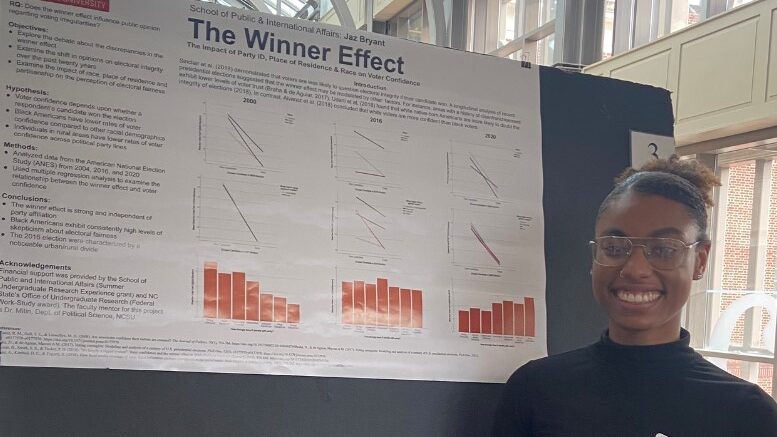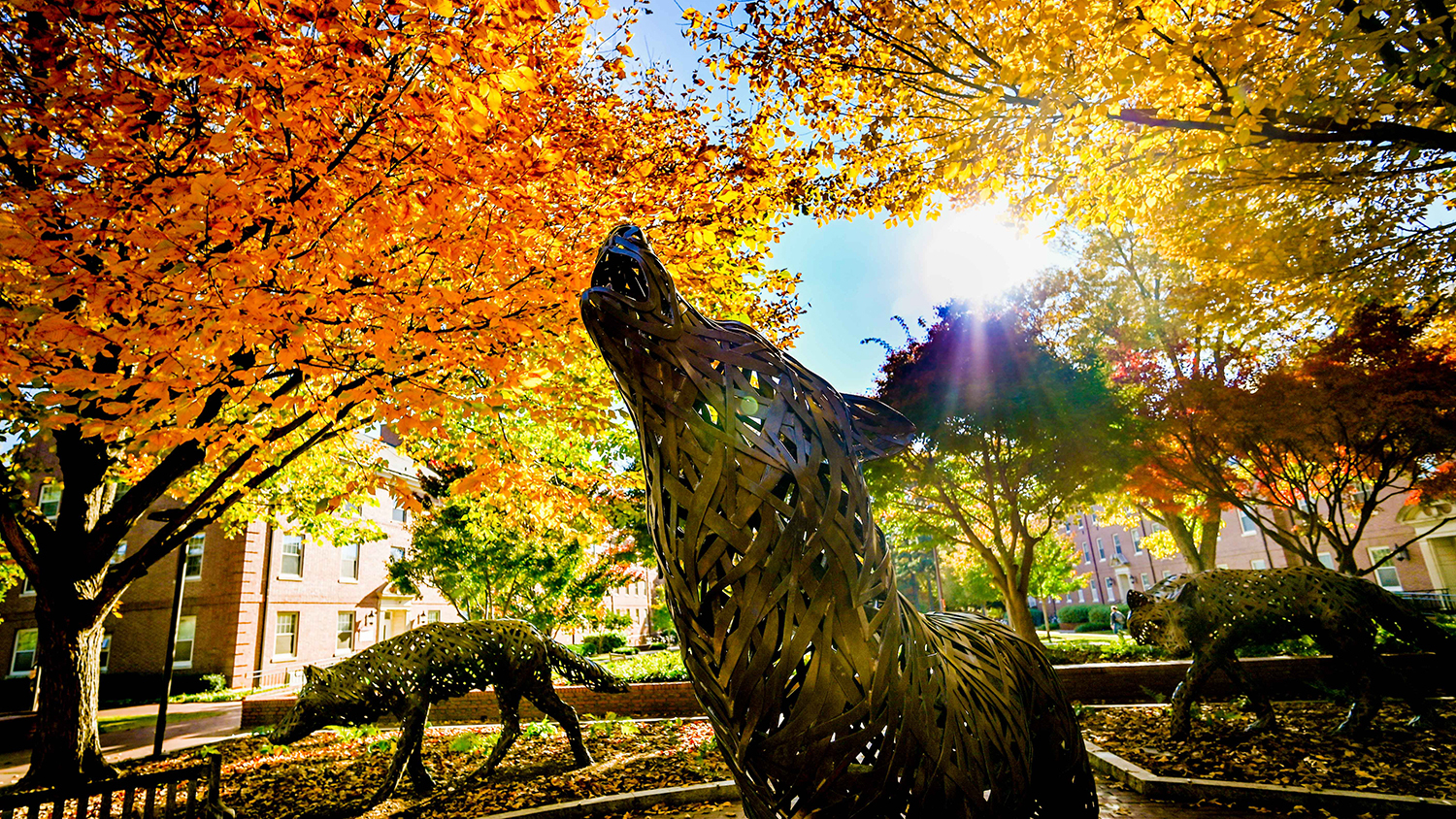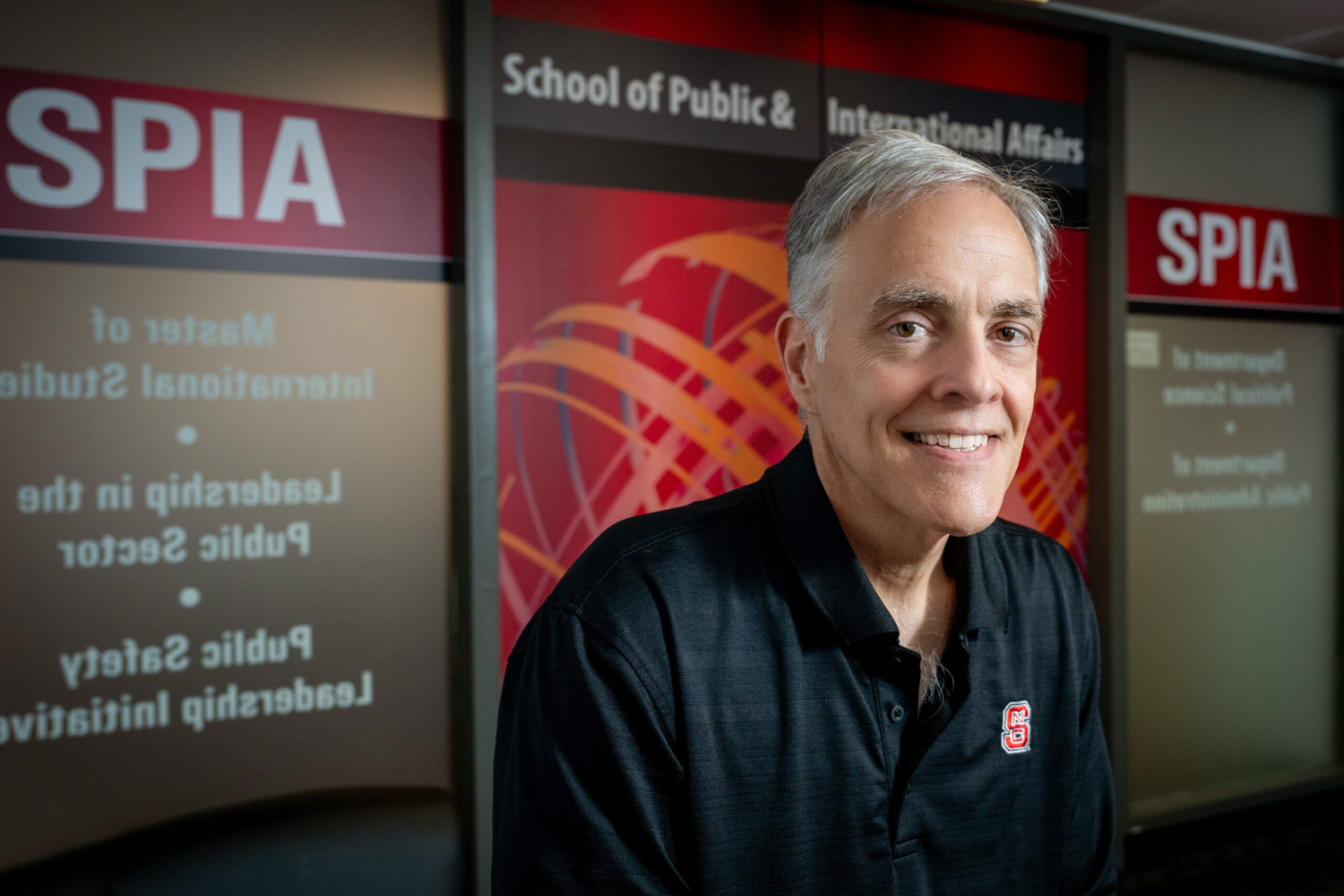Research Project Enriches Undergraduate Program

Jaz Bryant has accomplished a lot during her four years at NC State. A senior majoring in both political science (public policy) and science, technology and society (politics, policy and ethics in STEM), Jaz has remained an engaged student both in and out of the classroom. She edits and writes for the Nubian Message, has completed several political internships, is a legal assistant at a law firm, and recently presented her undergraduate research project at the State of North Carolina Undergraduate Research and Creativity Symposium (SNCURCS).
The symposium is a statewide conference that took place at the University of North Carolina at Wilmington in December 2022. Jaz’s presentation, “Sore Losers: The Winner’s Effect in the 21st Century,” examined some very real issues concerning modern elections.
“I used data from the America National Election Study (ANES) to analyze the winner effect and how people’s opinions on voting irregularities have changed throughout the years,” Jaz said. “The winner effect is the idea that if somebody’s candidate wins, they do not think voter fraud occurred and on the flipside, if their candidate loses, they think voter fraud occurred.”
We asked Jaz to share more about her research project and for her advice for other students who are thinking about getting involved in undergraduate research at NC State.
What did you learn from your research on the “winner effect” and voter irregularities?
I came in with a lot of preconceived notions about how this was going to go. Based off of the brief readings I had done before starting the research, I thought that conservatives and people in rural areas were going to have less voter confidence. But, I was surprised that actually Black Americans across all demographics – their party id or place of residence–had the lowest level of voter confidence. It did not matter if they won or lost. These findings were consistent during all three election years that I looked at: 2000, 2016 and 2020.
I chose the specific election cycles because 2000, 2016, 2020 because they were all very contentious races. I found that party identification was pretty consistent with the winner effect. It was not whether someone was conservative or liberal or Democrat or Republican, if they won the election was considered perfect. If they lost, it wasn’t considered to be a proper election.
How did you develop your initial research question?
I was in PS 371 with Dr. Mitin and for the final project in his class I had to do a review of the literature pertaining to a certain topic; one of the options was voter irregularities. This is where I came across the idea of a winner effect and I thought it was a really interesting concept. As a political science major I was also thinking about conversations that people have where they are not satisfied with an outcome. I have been working in the Office of Undergraduate Research since freshman year and knew they would help me develop this idea as a research project.
What were the most interesting and/or challenging aspects of your research?
The most interesting was that African-Americans specifically, Black Americans, have the highest level of voter skepticism across all demographics, controlling for variables. If I was in a doctoral program I would like to continue to look into the historical effects of this.
The most challenging part was that the data that I used is not my own, it is from the American National Election Study, so I had to go through and recode a lot of variables. Recoding and finding more variables that coincided with this question was the longest part of the research process. It was not necessarily hard, but it is a lot of strenuous work looking at data spreadsheet lines.
Did you enjoy your experience at the symposium (SNCURCS)?
It was amazing. I prepped with Dr. Showalter from the Office of Undergraduate Research. I did a mock presentation which really helped. At the actual event I had about 90 minutes with a poster board where I would share my 30-second mini presentation. People would also ask me questions or read the poster and ask follow up questions. One of the most exciting moments was when some members from the North Carolina Board of Elections visited my presentation and I was able to talk with them, although it was a little nerve-wracking because they are professionals and I have only been studying this for about six months.
I also enjoyed practicing my scientific communication skills with people who might not be familiar with this topic. It rejuvenated my excitement for the project because there were so many fresh faces to talk about this with. I became very passionate about this project.
How would a student get started with an undergraduate research project?
I feel like most people get scared, you have to remember that professors are here to help us learn. Be genuine about your interests and reach out to a professor whose class you have enjoyed. Go talk to the professor during office hours. Build a connection and ask questions. Many of them have spent a lot of years and time working on their research, and they would love to talk about it with you.
Also, reach out to the Office of Undergraduate Research and see what is available for undergraduates. You can also do independent research without an advisor. NC State has grants for that, and if you find a professor whose research interests align with your project, you can ask them to mentor you. It is important to start small, like with a research and literature review.
Do not be afraid of what you don’t know and do not be discouraged by suggestions or criticism. During many of my initial meetings with my advisor, as I was developing my project, he suggested I change my focus or a particular angle. As I got closer to the presentation date, Dr. Showalter would tell me to ‘do it again,’ presentation after presentation to get as much practice in so that I would feel comfortable. What some interpret as criticism is probably guidance; listen to it, learn, and grow. Dr. Mitin, my advisor, was wonderful. I do not think I would have completed the project if it was not for his mentorship. I have learned so much. He was a very good mentor to have.
What are your future plans/career goals?
I currently work as a legal assistant and I plan to do something along that avenue, or in journalism for the next two years, and then go to graduate school. I like data journalism which I practiced a lot with during this project and I would really like to work with policy writing, grants, or political journalism.
What is your favorite political science class that you have had?
There are two that would be my favorites. The first was Latin American and Caribbean Politics with Professor Clifford Griffin. I have taken every class Dr. Griffin offered and he is such an engaging Professor. The second was Comparative Politics with Dr. Erica Edwards. She is an amazing professor and very passionate about what she teaches.
Any last minute advice for students?
Even if it is not about research, go talk with your professors! They have so much good advice and can help you answer any questions that you may have about future plans. Maybe you will find something to research along the way.
- Categories:


